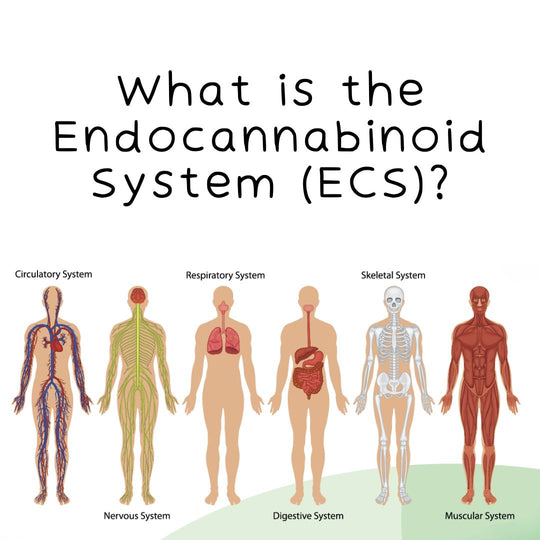What is the Endocannabinoid System (ECS)?

Named after the cannabis plant, the Endocannabinoid System (ECS) is a network inside our bodies that helps maintain balance. It influences many everyday functions including memory, sleep, mood, and even inflammation.
Surprisingly, few people have heard of it, even though it’s present in almost every animal on earth. The ECS was only discovered about 30 years ago, and research is still uncovering just how important it is to our overall health. One thing is certain: it’s inside all of us whether or not we’ve ever used cannabis.
How the ECS Works:
The system is made up of three main parts:
-
Endocannabinoids – natural molecules our body produces, similar to compounds in the cannabis plant.
-
Receptors – located throughout the body (in the brain, organs, glands, immune cells, and tissues) that the endocannabinoids bind to, triggering responses.
-
Enzymes – responsible for breaking down endocannabinoids once their job is done.
There are two primary receptor types:
-
CB1 receptors – mainly in the brain and nervous system.
-
CB2 receptors – mainly in the immune system and organs.
Think of the process like a lock and key: our body makes endocannabinoids (the keys), which fit into the receptors (the locks), helping regulate and balance internal systems.
Why is the ECS Important?
The ECS plays a role in a wide range of functions, including:
-
Digestion
-
Bone health
-
Inflammation
-
Heart function
-
Memory
-
Liver function
-
Mood
-
Metabolism
-
Reproductive health
-
Sleep
-
Stress
Cannabis and the ECS
So how does cannabis fit in?
The cannabis plant produces phytocannabinoids, which are similar to the endocannabinoids our body makes naturally. The two most well-known phytocannabinoids are THC and CBD.
-
THC – This compound interacts strongly with CB1 receptors in the brain, which is why it causes changes in perception and mood. Interestingly, THC was key in the original discovery of cannabinoid receptors.
-
CBD – Unlike THC, CBD is not psychoactive. It interacts with a variety of receptors in the body and is currently being studied for its potential role in areas like pain, inflammation, mood, and immunity.
Final Thoughts
Although the ECS was only discovered a few decades ago, it’s clear that it plays a vital role in keeping our bodies in balance. Research is still in its early stages, but scientists continue to uncover how this system interacts with compounds from plants like cannabis.
In Australia, access to medicinal cannabis requires a prescription, and products are carefully regulated. As studies evolve, we’re excited to see how much more we’ll learn about this fascinating system.
